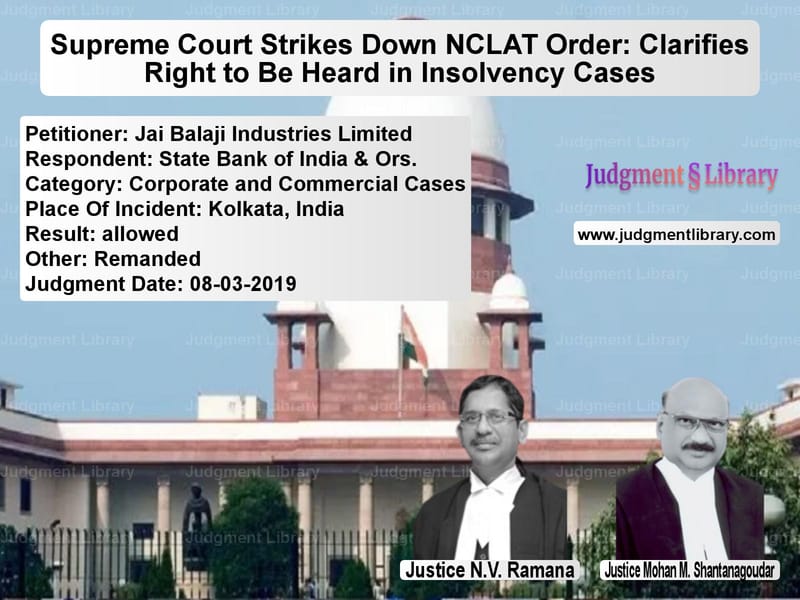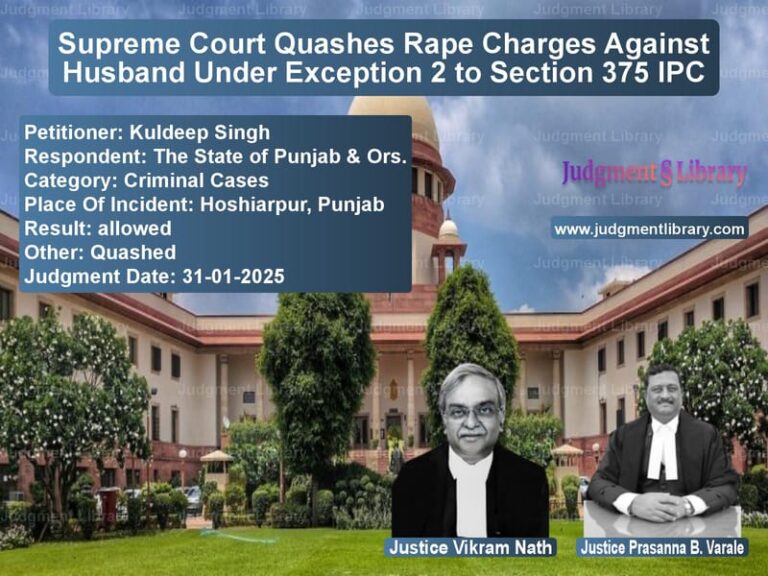Supreme Court Strikes Down NCLAT Order: Clarifies Right to Be Heard in Insolvency Cases
The Supreme Court of India, in the case of Jai Balaji Industries Limited vs. State Bank of India & Ors., ruled on a critical issue concerning the right to be heard in insolvency proceedings under the Insolvency and Bankruptcy Code, 2016 (IBC). The case arose when the National Company Law Appellate Tribunal (NCLAT) set aside an earlier National Company Law Tribunal (NCLT) order and directed the NCLT to admit an insolvency application filed by State Bank of India (SBI) against Jai Balaji Industries Limited (JBIL) under Section 7 of the IBC.
The Supreme Court found that the NCLAT had passed its order without giving JBIL an opportunity to be heard, thereby violating the principle of natural justice, audi alteram partem. The Court set aside the NCLAT order and remanded the matter back to the appellate tribunal for fresh consideration.
Background of the Case
The dispute involved a financial creditor, SBI, which had filed an insolvency application under Section 7 of the IBC against JBIL. The NCLT Kolkata Bench initially dismissed the application on 10 October 2018, holding that the financial creditor had not met the procedural requirements under the IBC.
Aggrieved by this decision, SBI filed an appeal before the NCLAT, which reversed the NCLT’s decision on 8 February 2019. The NCLAT order directed the NCLT to admit the application and initiate the Corporate Insolvency Resolution Process (CIRP) against JBIL.
Petitioner’s Arguments (Jai Balaji Industries Limited)
JBIL challenged the NCLAT order before the Supreme Court, arguing:
- The company was not given notice of the appeal before the NCLAT, violating its fundamental right to a fair hearing.
- The NCLAT order wrongly stated that all parties had been heard when, in reality, JBIL had not been given an opportunity to present its case.
- The principles of natural justice were disregarded as JBIL was not served with a copy of the appeal papers, nor was it informed about the hearing.
- The NCLAT’s directive to admit the insolvency application without further hearings undermined the due process required under the IBC.
Respondent’s Arguments (State Bank of India)
SBI, in defense of the NCLAT order, argued:
- The advance copy of the appeal had been delivered to JBIL’s registered office, providing adequate notice.
- JBIL’s counsel failed to appear before the NCLAT despite being aware of the proceedings.
- JBIL had been using legal tactics to delay insolvency proceedings, as seen in its parallel litigation before the Calcutta High Court.
- The NCLAT order was justified given that the NCLT’s dismissal of the insolvency application was legally unsound.
Supreme Court’s Observations
The Supreme Court rejected SBI’s arguments and held that JBIL’s right to be heard had been violated. The Court noted:
“The act of issuing an advance copy of an appeal does not amount to service of notice as per Rule 48 of the NCLAT Rules, 2016. Proper service requires an official notice from the tribunal.”
The Court further emphasized:
“The fundamental principle of natural justice, audi alteram partem (hear the other side), has been disregarded. NCLAT’s order cannot stand when it was passed without affording the appellant a fair hearing.”
Final Judgment
The Supreme Court ruled as follows:
- The NCLAT order dated 8 February 2019 was set aside.
- The matter was remanded to the NCLAT for fresh consideration.
- The NCLAT was directed to give JBIL an opportunity to present its case before making a final decision.
- The parties were instructed to appear before the NCLAT on 13 March 2019 for an expedited hearing.
The Court concluded:
“Tribunals must strictly adhere to principles of procedural fairness. Any decision affecting the rights of a party must be passed only after ensuring that the party has been heard.”
Implications of the Verdict
This ruling has significant implications for insolvency proceedings and procedural fairness in Indian tribunals:
- Reaffirmation of Natural Justice: The judgment underscores that tribunals cannot bypass fundamental principles of procedural fairness.
- Clarification on NCLAT Procedures: The ruling highlights the necessity of proper service of notices before deciding appeals.
- Protection for Corporate Debtors: The decision ensures that corporate debtors are given an opportunity to defend themselves before insolvency proceedings are initiated.
- Efficiency in IBC Cases: The ruling directs expedited hearings in insolvency matters, ensuring that disputes are resolved without unnecessary delays.
By reinforcing due process rights, this Supreme Court judgment strengthens transparency and fairness in India’s corporate insolvency framework.
Petitioner Name: Jai Balaji Industries Limited.Respondent Name: State Bank of India & Ors..Judgment By: Justice N.V. Ramana, Justice Mohan M. Shantanagoudar.Place Of Incident: Kolkata, India.Judgment Date: 08-03-2019.
Don’t miss out on the full details! Download the complete judgment in PDF format below and gain valuable insights instantly!
Download Judgment: Jai Balaji Industrie vs State Bank of India Supreme Court of India Judgment Dated 08-03-2019.pdf
Direct Downlaod Judgment: Direct downlaod this Judgment
See all petitions in Bankruptcy and Insolvency
See all petitions in Corporate Compliance
See all petitions in Company Law
See all petitions in Judgment by N.V. Ramana
See all petitions in Judgment by Mohan M. Shantanagoudar
See all petitions in allowed
See all petitions in Remanded
See all petitions in supreme court of India judgments March 2019
See all petitions in 2019 judgments
See all posts in Corporate and Commercial Cases Category
See all allowed petitions in Corporate and Commercial Cases Category
See all Dismissed petitions in Corporate and Commercial Cases Category
See all partially allowed petitions in Corporate and Commercial Cases Category







